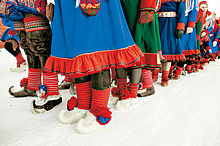Project:Northern Sami
 Norske samer. Foto: Karin Beate Nøsterud/norden.org | |
| Status | Aktivt |
|---|---|
| Start | Juli 2017 |
| Contact | Jon Harald Søby (WMNO) |
|
Project on Phabricator | |
This is the project page for Wikimedia Norge's Northern Sami project 2017–2020. Wikimedia Norge has started a project to improve the Northern Sami-language Wikipedia and get more Sami content to the Wikimedia projects. The Northern Sami Wikipedia currently has around 7,400 articles, which is very good for such a small language, but the problem is that very few people contribute to it. We wish to change that, but we can't do it alone!
Our goal is to improve the Northern Sami Wikipedia to make it a thriving and continually updated project. For that we need volunteer contributors who know Northern Sami.
If you know Northern Sami and think this sounds interesting, but don't know where to begin? Then we would love to get in touch with you (wikimedia@wikimedia.no)! The same also goes if you don't know Northern Sami, but are still interested in it, e.g. if you represent a potential partner, or even if you are just a private citizen interested in the subject.
Goals
The project's goals are twofold:
- Increasing and improving the coverage of Sami topics on Wikimedia projects in general
- Increasing the activity on the Northern Sami Wikipedia in particular
Progress plan
This project started in 2017 and is planned to last until July 2020:
- Phase 1
- Finding partners amongst volunteers and institutions with good knowledge of Sami language, history and cultural heritage
- Building alliances with cultural and educational institutions and relevant international networks
- Get in touch with former and current contributors to the Northern Sami Wikipedia, hold survey (phab:T182089)
- Participate in conferences to promote the project, build networks and learn from the work of others on small and indigenous language Wikipedias.
- Translate the bylaws, website and information material into Northern Sami.
- Reach out to Wikimedia chapters in Sweden, Finland and Russia to explore opportunities for collaboration.
- Phase 2
- Adding content to various Wikimedia projects in cooperation with volunteers and partners
- Upload data on places with Sami placenames from the Norwegian mapping authorities (phab:T185578)
- Upload the Sami bibliography from the National Library of Norway (phab:T184436)
- Uploading images and sound recordings from the Riddu Riđđu and Márkomeannu festivals
- Phase 3
- Supporting contributors, both volunteers and institutions
- Being a proponent of the Northern Sami Wikipedia adopting various technical tools that make editing easier
- Organizing an international Sami writing contest
- Organizing workshops in cooperation with Samisk hus in Oslo and the Sami University in Kautokeino
Advisory group

We have collected a group of Wikimedians and others from smaller projects and minority-language projects that can advise us on the project. The group consists of:
- Yupik bidragsyter på nordsamisk Wikipedia
- Eddie Avila, Rising Voices
- Biyanto Rebin, Wikimedia Indonesia
- Galder Gonzalez, Euskal Wikilarien Kultura Elkartea
- Vera de Kok, Wikimedia Nederland
- Robin Owain, Wikimedia UK
- Jean-Philippe Béland from Wikimedians of North American Indigenous Languages User Group
Activities
- Conference participation and workshop: Celtic Knot and learning pattern from workshop, July 2017 og Learning pattern skrevet fra workshop, juli 2017
- User survey Nov–Dec 2017
- Writing contest about peace, won by Northern Sami Wikipedia contributor, Oktober 2017
- Travel to Kautokeino 13 February–16 February 2018
- Wikimedia Norge's general assembly was held at Samisk hus in Oslo on 3 March 2018, in conjunction with wiki meet-up, drone safari and Wikidata workshop 3–5 March 2018
- Partnership with Whose Knowledge?, April 2017
- Conference presentation, Celtic Knot 4–6 July 2018, Aberystwyth, Wales
- Participation at the 2018 Riddu Riđđu festival, July 2018, Manndalen, Kåfjord municipality

- Conference presentation, July 2018, Cape Town
- Participation at the 2018 Márkomeannu festival with the festival library (Nordland County Library), July 2018, Gállogieddi
- Partnership with URALIC Centre, Project To Develop Civil Society Network for Revitalising Indigenous Languages in the Baltic Sea Region, June 2018
- Rødlenke-liste (Women in Red) laget av bidragsyter Yupik
- Presentasjon av prosjektet for to avSametinget sine komiteer i Karasjok. 19. september 2018
- Søknadsfrist for prosjekt som markerer FN's internasjonale år for urfolksspråk. 2. november 2018
- Godkjent som Civil Society Partner for UNESCOs internasjonale år for urfolksspråk.
- Møte med samiske språksentre på Samisk hus i Oslo. 6. november 2018
- Møte med kulturelle aktører fra Samisk arkiv, Riksarkivet, Norsk folkemuseum, NVE og Riksantikvaren for å danne en arbeidsgruppe for frigjøring av samisk materiale på nett. 16. januar 2019
- Deltakelse på Samisk språkkonferanse 2019 i Tromsø, i regi av Sametinget. 4.–5. februar 2019.
- Internasjonal skrivekonkurranse for og om uralske minoritetsspråk. Februar 2019.
- Wikimedia Norge deltar på festivalen Márkomeannu i festivalteltet til Nordland fylkesbibliotek (reisen er støttet av Unesco Norge)
- Wikimedia Norge deltar på Riddu Riđđu Festivála (reisen er støttet av Fritt Ord)
- Wikimedia Norge arrangerer et arrangement på Nasjonalbibliotek, 10. oktober
- Samisk er tema for månedens språkkonkurranse på Wikipedia i oktober
See also
- The project on Phabricator
- Wikimedia Norge's application to the WMF 2017–2018 which covers this project amongst other things
- Wikimedia Norge's application to the WMF 2018–2020 which covers this project amongst other things
Andre relevante prosjekter
- Wikipedia Cultural Diversity Observatory (WCDO)
- Kaqchikel Wikiwuj, editathon and leadership/capacity building
- Indigenous Languages and Knowledge on Wikimedia Projects Toolbox
- These Sámi Women Are Trying to Keep Their Native Skolt Language Alive
- URALIC Centre Joins New Project To Develop Civil Society Network for Revitalising Indigenous Languages in the Baltic Sea Region
- Learning pattern on Centering Marginalised Knowledge written by Whose Knowledge?
